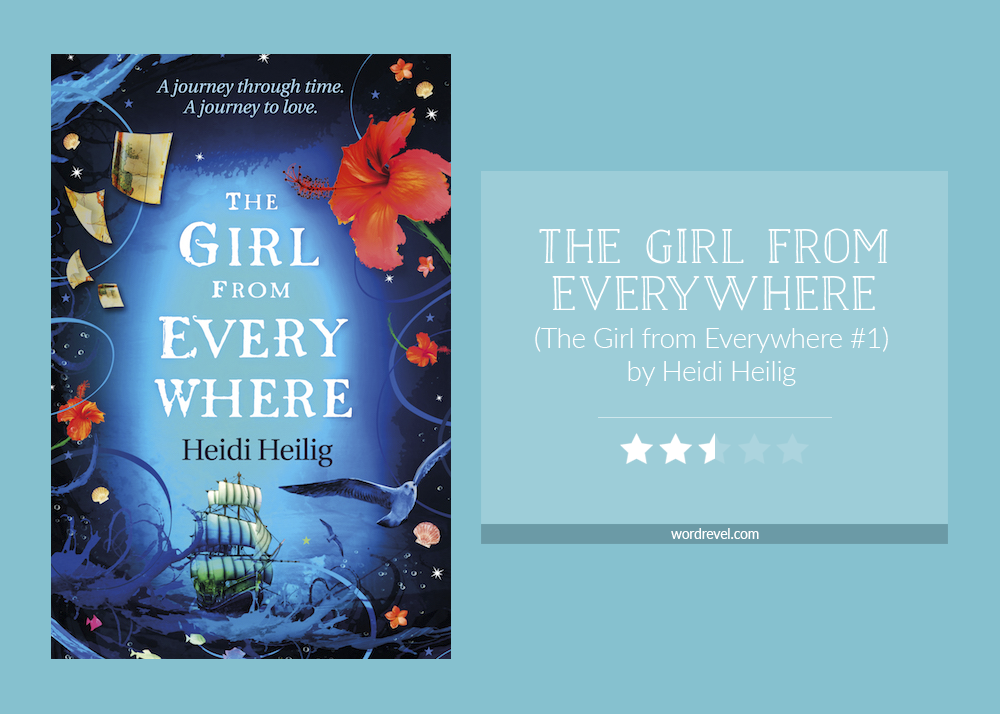Disclosure: I received a finished copy of the book from Pansing Books, a regional distributor, in exchange for an honest review. This does not affect my opinion of the book or the content of my review.
 The Girl from Everywhere (The Girl from Everywhere #1) by Heidi Heilig • contains 343 pages • published March 3, 2016 by Hot Key Books • classified as Fantasy, Historical Fiction, Young Adult • obtained through Pansing Books • read as paperback • shelve on Goodreads
The Girl from Everywhere (The Girl from Everywhere #1) by Heidi Heilig • contains 343 pages • published March 3, 2016 by Hot Key Books • classified as Fantasy, Historical Fiction, Young Adult • obtained through Pansing Books • read as paperback • shelve on Goodreads Synopsis:
Sixteen-year-old Nix Song is a time-traveller. She, her father and their crew of time refugees travel the world aboard The Temptation, a glorious pirate ship stuffed with treasures both typical and mythical. Old maps allow Nix and her father to navigate not just to distant lands, but distant times - although a map will only take you somewhere once. And Nix's father is only interested in one time, and one place: Honolulu 1868. A time before Nix was born, and her mother was alive. Something that puts Nix's existence rather dangerously in question...
Nix has grown used to her father's obsession, but only because she's convinced it can't work. But then a map falls into her father's lap that changes everything. And when Nix refuses to help, her father threatens to maroon Kashmir, her only friend (and perhaps, only love) in a time where Nix will never be able to find him. And if Nix has learned one thing, it's that losing the person you love is a torment that no one can withstand. Nix must work out what she wants, who she is, and where she really belongs before time runs out on her forever.
Time Travel Didn’t Matter Enough
Time travel in books is my weakness. I used to actively seek them out as a kid. Nowadays reading about such stories feels like visiting old friends. Sadly, The Girl from Everywhere didn’t quite have enough of it. The setting of The Girl from Everywhere was predominantly Honolulu 1884. There were glimpses of India, New York and China from various eras but not a lot happened in these places. Being stuck in Hawaii for so long gave rise to a slower moving plot than I had anticipated.
The concept of time travel was hardly explained as well. View Spoiler »
At Least Hawaii Was Beautiful
Docking in Hawaii was a welcome consolation for the lack of time travel. The tropical setting was vivid and definitely a change of scenery from cities in which most contemporary and historical fiction tend to take place. If The Girl from Everywhere ever gets optioned as a film or TV show, I’d watch it just for the view and atmosphere. Even just with words, The Girl from Everywhere conveyed these beautifully.
Points for Kashmir
Secondary characters tend to not be as developed as main characters. In the case of Kashmir though, The Girl from Everywhere had an exceedingly strong secondary character. He had sass, was witty and all-around entertaining. In a way, he provided comic relief during times the plot moved along a little slower. He kept Nix on her toes and for that, I absolutely loved him.
I Mentally Threw Slate and Blake Overboard
Kashmir had a lot of charm but he and Nix couldn’t carry the story alone. Slate annoyed me because the portrayal of his obsessions with getting the perfect map of Honolulu 1868 made him a very two-dimensional character. He was a non-existent father to Nix and really, there was little development to his character. Blake was so bland, I thought him rather superfluous.
Magical Inspiration from Legends and Myths
The Girl from Everywhere benefitted from the incorporation of legends and myths. These were from around the globe, from very different cultures and yet their collision in The Girl from Everywhere gave rise to creative details. Some of them were deliberately altered to fit the story but on the whole, they invoked a great sense of wonder.
Cultural and linguistic gripes
Disregard for Chinese Ethnicities in 1880s Hawaii
About a third through The Girl from Everywhere, Nix had an exchange about the meaning of her name. While nix could mean nothing in several languages, Nix pointed out that the reverse, xin means happy.
欣 (xīn) in Mandarin does mean happy. That might be all well and good, except in 1880s Hawaii the Chinese didn’t conventionally speak Mandarin. Three-quarters of the Chinese immigrants were Cantonese-speaking. The transliteration for 欣 is san. The remaining one-quarter was Hakka-speaking. Xin is a close approximation of how they pronounce 欣. However, there also was a reference to the number five (五) as ‘wu’. In Mandarin that’s wǔ but for Hakka, this doesn’t even remotely apply. The Hakka pronunciation of 五 is much closer to ‘ng’.
This is why I conclude that neither Cantonese nor Hakka were the Chinese languages used in the context of The Girl from Everywhere. Instead it seems that the author adopted Mandarin as the lingua franca of the Chinese in 1884 Hawaii. That doesn’t fit with the historical demography of Chinese immigrants to the island.
Further Apparent Spelling Errors
Guzheng was misspelled as “guhzeng” and that sprung out at me since the word was italicised to denote its foreign origin. I hesitate to refer to it as a typographical error because the same misspelling appeared twice in the book. There were no signs of a deliberate choice of unconventional spelling. There was no reason to believe that the instrument in question was a modified version special to The Girl from Everywhere.
Another notable term used was “huʻakai po” which doesn’t coincide with the conventional spelling either. The Hawaiian folklore refers to night marchers as huakaʻi po. The placing of the ʻokina (ʻ) might not seem significant but in tandem with the linguistic errors, it adds up.
Need for Cultural Sensitivity
Diversity is great and wonderful but if a culture is foreign, the onus is on the author to do thorough research. If it’s a culture familiar to the author, all the more reason to ensure an accurate portrayal of a culture which is unknown to most readers.
References:
- The Chinese in Hawai’i: A Historical and Demographic Perspective by Eleanor C. Nordyke & Richard K.C. Lee
- History of the Chinese American Community by H.M. Lai (Him Mark Lai was a scholar of Chinese American culture)

I can’t believe I missed this review! I It’s awesome how you went through and realised Mandarin was the language used – I dont think I would have! Add to that your knowledge of Chinese immigrants in Hawaii at the time, and this made for a really interesting read!
I found what you said about the Chinese in here really fascinating Jo! I’m Chinese myself, so while reading the translations I found a few errors that didn’t quite add up as well. I think the author is actually half Chinese, so I found some of this to be pretty strange, especially now that you say that it’s not technically correct for Hawaii. I wasn’t a fan of Blake either! But there were some wonderful elements in here.
It seems like this one was kind of fifty/fifty good and bad for you, Jo! I really love time travel books, too, but it seems like the ones being released in the YA genre at the moment aren’t doing the theme justice. I haven’t heard good things about them, at least. I’m always left a little disappointed if the time travel aspect isn’t explained well enough, which is one of the reasons why I love All Our Yesterdays. That book is the go-to for YA time travel, as far as I’m aware :D
I love well developed secondary characters, but Nix’s father sounds like a character only driven by one thing, which is a shame.
Ah, I heard similar things in terms of culture and language when it came to Soundless by Richelle Mead. I wonder if the authors are using the language differently because it’s set in an alternate universe to ours? Even so, that doesn’t really make much sense. Surely it would be easier to use the correct language, spelling etc.?
I have this one for review, and I’m really interested in reading it because I have seen good AND so-so reviews for it, and I always love to see where I fit on the spectrum.
Wonderful review, lovely <3
Yeah, it was. I can’t remember the last time I was so aggravated by a book yet loved a good number of elements. That’s why I felt so torn and settled on a 2.5-star rating. I am fairly optimistic though that the sequel will feature more time travel, so I definitely intend to pick it up when it’s published.
I had no idea All Our Yesterday’s involved time travel. The audiobook’s been loaded on my phone for the longest time, so I should listen to it really soon! Haha.
Ah, yeah. I don’t intend to read Soundless but from what I heard, it butchered Chinese culture. The Girl from Everywhere wasn’t that extreme and it did get the Mandarin right but it shouldn’t have been Mandarin based on the historical demography.
A good example of altered language in an alternative universe would be Shadow and Bone. That one annoyed me too for the mixed Russian and Russian-inspired words. Would’ve liked some linguistic consistency. I know every time I read kefta, I wanted to chuck the book for not sticking to the actual Russian word, kaftan.
Can’t wait for you to read it. I’m also curious what you end up thinking about it.